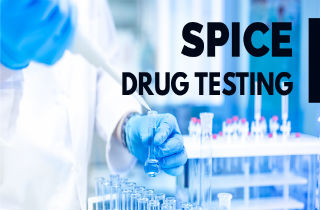ARTICLE SUMMARY: Currently, drug detection times for synthetic cannabinoids is up to 3 days after use. However, dug testing for synthetics is not yet available commercially via at home kits. Instead, testing requires special handling to specialized laboratories in the U.S.
TABLE OF CONTENTS
- Types of Synthetics
- What’s In Synthetic Weed?
- Normal Drug Tests
- Specialized Drug Tests
- Detection Times
What Types of Synthetics Are There?
The first synthetic marijuana compounds were developed in the 1980s and 1990s by researchers looking for new treatments for diseases such as HIV and multiple sclerosis. However, because these man-made cannabinoids act on the same brain cell receptors as THC (delta-9-tetrahydrocannabinol), people noted stronger effect and began using the compounds recreationally. In fact, synthetic cannabinoids are part of a group of drugs called by the National Institutes of Drug Abuse “new psychoactive substances”. Some compounds like JWH are relatively well-known, while others are created to meet market demand.
In fact, new strains of synthetic marijuana are constantly hitting the market, so it’s difficult to describe the exact chemical nature of their compounds. Most are sold under a brand names. K2 and Spice being the most famous. But, new brand names and new packaging come on the market regularly as manufacturers change the chemical composition to try to stay ahead of law enforcement. Buying the same brand twice is no guarantee that the content or quality of the drugs (or their effects) will be the same in both packages.
What’s in synthetic weed, exactly?
Synthetic marijuana is a type of chemical that is made to mimic the effects of THC and sprayed on dried plant material or are sold in liquid form for use in an e-cigarette or vape pen. Unlike THC, the compounds are high-potency, high-
According to the Washington D.C. Department of Behavioral Health, synthetic weed is very dangerous. Using it can cause:
- anxiety
- confusion
- elevated heart rate
- hallucinations
- paranoia
- suicidal thoughts
- unconsciousness
- violent behavior
- vomiting
…and even death. In fact, the problem is so serious that, according to the 2011 DAWN Report, the Substance Abuse and Mental Health Services Administration (SAMHSA) stated that synthetic cannabinoids were responsible for 28,500 emergency room visits in 2011. These drugs can cause a person to become incoherent, disorderly, and aggressive. Effects can last for hours and symptoms are very difficult for doctors to treat.
Why? Because the chemicals found in these branded packages includes potent hallucinogens. In fact, a single package may contain multiple drugs which are even more dangerous in combination. Indeed, much of what is known about the short and long-term effects of these substances on physical and psychological health comes from individual reports of use that crop up through emergency department visits, calls to poison control centers, and online forums.
Normal Drug Tests
Drug tests are performed using a biological specimen to determine the presence or absence of synthetic weed or its metabolites. One of the reasons that the use of synthetic cannabinoids became so popular over the last few years was that they don’t show up in traditional drug tests. Or more accurately, testing labs couldn’t detect the metabolite(s) in urine. This meant that folks could puff away at their JWH infused herbs safe in the knowledge that their jobs were not in danger.
There are a number of unique challenges when detecting synthetic cannabinoids present in urine, oral fluid, and serum samples. Mainly, each type of fake weed contains synthetic cannabinoids from different chemical classes and has a composition that is constantly changing. Therefore, a laboratory test that could cover all of these chemical classes is needed.
However, this seems to be about to change. Now that JWH compounds are banned because of the severity and seriousness of herbal incense side effects, there is big money to be made in developing a simple to use test for detecting synthetic cannabinoids in urine.
Specialized Drug Tests
As of yet there is no simple, practical way to test individuals for synthetic weed compounds on a mass, commercial scale. On the other hand, there is a test available now that can detect synthetic weed in urine or blood. Several compounds such as JWH and many metabolites can be measured in the serum through liquid chromatography tandem mass spectrometry (LC-MS/MS) and gas chromatography mass spectrometry (GC/MS). In future, hair and saliva testing are likely to receive more attention as viable biological sample specimens.
While there are no commercially available laboratory tests for the detection of synthetic cannabinoids, there are a number of specific laboratories that can detect synthetic cannabinoids. However, this is not some easy to use at home test. Rather, tests have to be sent to the lab (where the test was developed) within a specific time frame otherwise the urine will deteriorate to such an extent that the test will be useless. Furthermore, tests are usually sent to the laboratory via postal service; the results are not immediately available. So, these specialized drug tests are typically not used on-site for clinical diagnosis or treatment.
Detection Times
There are hundreds of current variations of fake weed, which makes an accurate assessment of detection times difficult. Two of the main cannabinoids that are commonly used in many batches, JWH-018 and JWH-073, will show up on a drug test for about three days. Many of these drugs, especially unchanged synthetic cannabinoids, exist in urine and blood for only a short period. More about specific cutoff limits in urine-based samples from this 2016 Department of Defense targeted study on synthetic marijuana.
Then how do I know if someone has been using synthetic weed?
You don’t. Other than using common sense and looking out for the telltale signs of use (which are very similar to those of marijuana) such as:
- detachment
- general slowness of movement
- lethargy
- loss of interest in work/hobbies
- paranoia
- red eyes
- smoking paraphernalia such as papers, bongs, pipes etc.
- subdued behaviour
If your recognize the signs and symptoms of synthetic cannabis abuse and/or addiction in yourself or someone close to you…don’t wait to get help from professionals. Get yourself prepared for what to expect by learning more about what’s it like to seek help from Spice and K2 addiction treatment programs and how you can choose the best treatment type, duration, and therapies for you.
More Questions?
For the past few weeks, I’ve been writing about how synthetic cannabinoids (herbs infused with JWH compounds) are not some harmless legal substance that kids smoke in a vain attempt to get high. They are, in fact, a drug as potent (if not more potent) than top grade skunk with very real effects that are not always pleasurable and, in some cases, downright dangerous.
Do you have questions about synthetic cannabis? Please ask them below. We will respond to you personally, and help where we can.










Related Posts